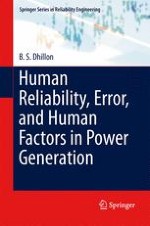2014 | OriginalPaper | Chapter
5. Specific Human Reliability Analysis Methods for Nuclear Power Plants
Author : B. S. Dhillon
Published in: Human Reliability, Error, and Human Factors in Power Generation
Publisher: Springer International Publishing
Activate our intelligent search to find suitable subject content or patents.
Select sections of text to find matching patents with Artificial Intelligence. powered by
Select sections of text to find additional relevant content using AI-assisted search. powered by
